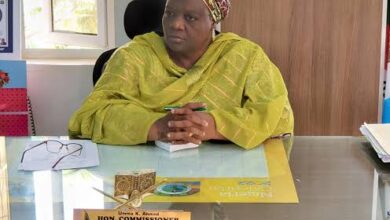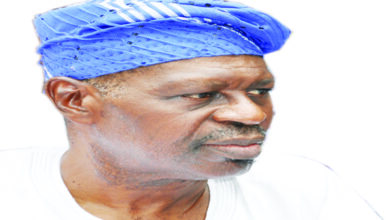Powering Nigeria’s Digital Economy: Mastercard’s Vision for Payments, Inclusion, and SME Growth

Mastercard Country Manager and Area Business Head, West Africa; Folasade Femi-Lawal spoke with The Punch
Q; Payments remain a challenge for businesses in Nigeria, especially SMEs. How is Mastercard helping resolve this challenge?
A; Nigerian businesses, particularly small and medium enterprises (SMEs) face significant challenges in accepting payments. One of the key hurdles is the accessibility and affordability of digital payment solutions. While contactless payments are transforming commerce worldwide, many SMEs struggle to adopt this technology due to the high cost of digital equipment and software. Recognising this, Mastercard has introduced innovative, flexible, and cost-effective solutions aimed at bridging this gap and promoting financial inclusion.
As part of our efforts, Mastercard introduced a suite of contactless solutions in Nigeria in 2023, including Tap on Phone technology in collaboration NetPlus. This innovation allows merchants to accept contactless payments via Android devices, thereby eliminating the need for separate Point-of-Sale (POS) hardware. Additionally, Mastercard’s solutions enables small business owners to transform their smartphones into versatile payment terminals using Tap on Phone, QR Link2Pay, and Pay by Link technologies, offering customers a seamless, secure, and easy shopping experience. The impact of these solutions extends beyond individual transactions, driving broader adoption of digital payments in the region. Looking ahead, plans are underway to introduce contactless Tap & Go technology, providing an even more seamless and efficient payment experience for both merchants and customers.
In addition to these contactless solutions, Mastercard is addressing fundamental financial challenges with the introduction of Essential Debit (‘Naija Card’), a Debit product which addresses domestic billing needs, optimizes card issuance costs, and simplifies fee structures, providing a sustainable and efficient solution for Nigerian consumers and issuers facing FX liquidity challenges. This innovation exemplifies Mastercard’s ability to adapt to local market conditions and deliver tailored solutions that enable financial access and inclusion. As Michael Miebach, Mastercard’s CEO, put it, we have made Mastercard a systemically important global player that is domestically relevant, and the Naija Card exemplifies this approach.
Mastercard’s commitment extends beyond hardware to strategic programs. Through programs like Product Express, launched in Africa in October 2024, we aim to accelerate the rollout of new card programs and other payment solutions for fintech companies. By offering a simplified and efficient process, Product Express enables financial institutions to quickly integrate and deploy innovative payment services. In Nigeria, institutions like Wema Bank are leveraging this platform to enhance the security of their services, streamline payment processes, and boost operational efficiency.
Recognizing that payment challenges often require collaborative efforts, Mastercard has forged strategic alliances to drive broader impact. In collaboration with the African Development Bank Group, we launched the Mobilizing Access to the Digital Economy (MADE) Alliance: Africa. This initiative aims to provide digital access to essential services for 100 million individuals and businesses across the continent by 2030, with a focus on supporting the agricultural sector and women. In Nigeria, the MADE Alliance will pilot a program that provides digital identities and agricultural inputs to three million farmers, fostering inclusive growth and expanding digital access to underserved communities.
Mastercard also works with government organizations to address payment challenges at scale. Through our collaboration with the Lagos State Employment Trust Fund (LSETF), we are providing SMEs with digital payment tools and offering financial training to support their transition to a cashless economy.
Furthermore, collaborations with companies like Omniretail, Duplo, and Alerzo are helping businesses thrive in Nigeria’s evolving economic landscape. Omniretail offers fully integrated digital infrastructure for traditional retailers, while Duplo helps businesses simplify and automate their financial operations, from payments and reconciliation to vendor and spend management. Alerzo is focused on enhancing businesses through digital payment solutions, financial training, and access to credit, which supports long-term sustainability and growth.
Through these varied initiatives and collaborations with fintechs, SMEs, government bodies, and development organizations, Mastercard is actively working to resolve payment challenges in Nigeria and across Africa, enabling businesses to grow, innovate, and thrive in the digital economy.
Q; The International Finance Corporation in a recent report said that the high cost of digital equipment and software in Africa was stopping businesses from digitalization of their operations. How can this challenge be resolved, especially with the solutions that Mastercard has?
A; Digital transformation is often hindered by the high costs of infrastructure and digital tools—a challenge that Mastercard is working actively to overcome. We address this by providing solutions that lower the barriers for businesses to enter the digital economy, such as the Mastercard Naija Card in collaboration with Zenith Bank, which offers affordable banking solutions specifically tailored for consumers. Additionally, our collaboration with KaiOS, which is aimed at providing mobile devices with embedded digital acceptance solutions, reduces the costs of payment acceptance devices and increases access for small businesses across West Africa. Our SME-in-a-Box and Tap on Phone solutions are more examples of particularly impactful initiatives launched by Mastercard, as they minimize the need for costly hardware and simplify digital onboarding processes for small businesses. By empowering businesses with affordable and accessible technology, we’re enabling SMEs to leverage digital tools for growth, bringing them into the digital economy while reducing associated costs.
Q; Contactless payments are becoming increasingly popular in West Africa. How is Mastercard contributing to this trend, and what challenges or opportunities do you foresee in scaling contactless adoption across the region?
A; Despite the rise of digital payments, cash remains the dominant payment method in West Africa. For instance, in Nigeria, cash transactions accounted for approximately 76% of all transactions in 2024. Contactless payments offer a convenient, fast, and secure alternative to cash, which is crucial for enhancing financial inclusion and reducing the reliance on cash.
Mastercard is at the forefront of the contactless payment wave in West Africa, having introduced contactless solutions to Nigeria in 2023. Our Tap on Phone technology enables merchants to transform Android smartphones into contactless payment terminals without the need for additional hardware. This solution has been pivotal in expanding digital payments by making it easier for small businesses to accept contactless payments.
To further extend the reach of contactless payments, Mastercard is leveraging strategic partnerships with mobile network operators (MNOs) such as MTN Group Fintech. These collaborations allow customers to link mobile wallets to Mastercard’s virtual payment solutions, creating a seamless and secure payment experience. This approach is particularly impactful in rural and underserved areas, where mobile penetration is high, but access to traditional banking services is limited.
Despite these advancements, challenges persist in scaling contactless adoption. Raising awareness among consumers and merchants, enhancing infrastructure to support widespread use, especially in rural regions, and addressing security concerns to build trust are critical areas of focus. Yet, the opportunities are significant. As more Nigerians experience the convenience and speed of contactless payments, adoption is likely to increase, providing a pathway for greater financial inclusion.
Mastercard remains committed to overcoming these barriers by fostering strategic collaborations, investing in infrastructure, and educating stakeholders about the benefits of contactless payments. Through these efforts, Mastercard is working to create a secure and inclusive ecosystem where contactless payments can thrive, ultimately reducing reliance on cash and driving digital payment growth across West Africa.
Q; Investments in female-founded and female-led businesses on the African continent have continued to lag, does Mastercard have initiatives targeted at such businesses?
A; Mastercard is deeply invested in promoting gender equity across Africa, and we’ve launched several initiatives specifically aimed at empowering female-founded and female-led businesses. In 2023, and ahead of schedule, Mastercard exceeded its commitment made in 2020 to provide 25 million women entrepreneurs with solutions to help grow their businesses.
One of our prominent programs, the Girls4Tech initiative, empowers young girls to pursue careers in STEM (Science, Technology, Engineering, and Mathematics). Multiple programs in South Africa, Nigeria, Ghana and Kenya have contributed to Mastercard reaching 7 million girls in the span of a decade. Additionally, through our Start Path program, female-led startups gain access to Mastercard’s expertise and resources, helping them scale their businesses effectively. By focusing on financial inclusion and providing dedicated support to women entrepreneurs, Mastercard is fostering an environment where female-founded businesses can thrive, addressing the funding and support gap they often face.
Q; Mastercard recently partnered with the African Development Bank Group on the Mobilizing Access to the Digital Economy Alliance Africa. What has been the impact of the initiative so far?
A; Mastercard’s collaboration with the African Development Bank Group (AfDB) through the Mobilizing Access to the Digital Economy (MADE) Alliance for Africa is making substantial strides toward digital and financial inclusion across the continent, aiming to connect 100 million individuals and businesses within the next decade. This collaboration specifically targets underserved communities, addressing the critical gaps in access to essential digital services, financial tools, and payment options that are key for inclusive economic development.
The MADE Alliance has also enabled access to financial services, including loans and insurance products. These services, once inaccessible, now provide a safety net that promotes sustainability and long-term growth for smallholder farms. The program has provided farmers access to global markets, opening new revenue channels and allowing them to sell their produce at fair prices and reduce post-harvest losses. This market access not only maximizes income for farmers but also contributes to overall food security by improving the availability and distribution of agricultural goods.
A pilot program launching this year in Kenya, Tanzania, and Nigeria aims to support three million farmers by working with local banks to enhance financial inclusion. Looking ahead, Mastercard and AfDB are committed to expanding the MADE Alliance to Uganda, Ethiopia, and Ghana, further empowering communities and driving economic growth through digital inclusion.
Q; A year into your role as Country Manager for Mastercard in West Africa, what are some of the key milestones you’ve achieved? How have these shaped Mastercard’s presence in the region?
A; Over the past year, Mastercard has made significant strides in West Africa, not only through commercial deals but also by fostering strategic collaborations that support the region’s economic development. These efforts go beyond transactional achievements to focus on creating an inclusive and innovative payments ecosystem. By engaging with a diverse range of stakeholders, including financial institutions, fintechs, development organisations, and government bodies, Mastercard is driving systemic change that benefits both businesses and consumers.
A key highlight of this approach has been Mastercard’s collaboration with leading financial institutions like First Bank of Nigeria, Zenith Bank, Access Bank, Guaranty Trust Bank, Providus Bank and the United Bank for Africa. Rather than focusing solely on individual deals, these collaborations have centered on co-developing payment infrastructure and financial solutions tailored to the unique needs of West African markets. For instance, Mastercard’s collaboration with Access Bank collaborated to offer seamless cross-border payment solutions to over 150 countries. Recognizing the specific domestic needs of the Nigerian market, we also launched the Essential Debit (Naija Card), a Debit solution designed to simplify local payments and address key market challenges.
Another strategic focus is Mastercard’s commitment to advancing financial inclusion across West Africa. This is not limited to product launches but extends to holistic initiatives that address the root causes of exclusion, such as with the MADE Alliance initiative. In Nigeria, this initiative has a strong focus on supporting agricultural communities and seeks to strengthen rural economies, promote inclusive growth, and increase financial participation.
Collectively, these milestones have not only strengthened Mastercard’s regional presence but have also contributed to a more inclusive and digitally connected future for West Africa. By fostering strategic partnerships and making targeted investments, Mastercard continues to play a key role in driving innovation, supporting economic growth, and transforming the financial landscape of the region.
Q; Mastercard has been involved in collaborations with banks to enhance cross-border payments. Can you elaborate on the importance of these partnerships, their impact on the region’s financial landscape, and any plans to expand their scope?
A; Mastercard’s collaborations with banks, particularly in enhancing cross-border payments, are crucial in shaping the financial landscape of Africa and beyond. These partnerships aim to address critical challenges in the region, such as high transaction fees, slow processing times, and limited access to banking infrastructure, which have historically hindered financial inclusion.
For instance, Fidelity Bank and Mastercard launched Fidelity Send, a solution offering near-real-time fund transfers to over 60 countries. This collaboration directly targets the needs of Nigerian businesses and individuals by providing a cost-effective and transparent means for sending and receiving funds globally. Fidelity Send is designed to make cross-border payments quicker and more secure, supporting Nigeria’s growing remittance flows.
Similarly, Access Bank collaborated with Mastercard to offer seamless cross-border payment solutions to over 150 countries. This collaboration focuses on improving diaspora remittances, which are vital for Africa’s economic growth. With Nigeria accounting for a significant share of remittance flows into the continent, this partnership helps solve common issues faced by those sending money home from abroad, providing greater security and flexibility.
These collaborations contribute to advancing financial inclusion across Africa, fostering economic growth, and opening new opportunities for businesses. Mastercard’s commitment to bringing one billion people into the digital economy by 2025 is reflected in these partnerships, which seek to democratize financial services and bridge the financial divide.
Q; What do you envision for the future of payments in West Africa? What are the key trends and innovations that will shape this future, and how is Mastercard positioning itself to lead in this evolving landscape?
A; The future of payments in West Africa is poised to be transformative, with advancements in digital technology and financial inclusion driving rapid changes. I anticipate that innovations like contactless payments, AI, and cross-border transaction solutions will become more widespread, providing seamless, secure, and convenient options for consumers and businesses. Mastercard is positioning itself as a leader in this evolving landscape by investing in these technologies and forging strong collaborations with banks, fintechs, and governments. Through our commitment to security, innovation, and accessibility, Mastercard is dedicated to shaping a future where digital payments are integral to West Africa’s economic growth and social development
Folasade Femi-Lawal is the Country Manager, West Africa at Mastercard. Based in Nigeria, Folasade is responsible for advancing the Mastercard brand presence in West Africa, overseeing performance and strategic direction, deploying innovative payment solutions, and partnering with local governments and market regulators to build a World Beyond Cash.





